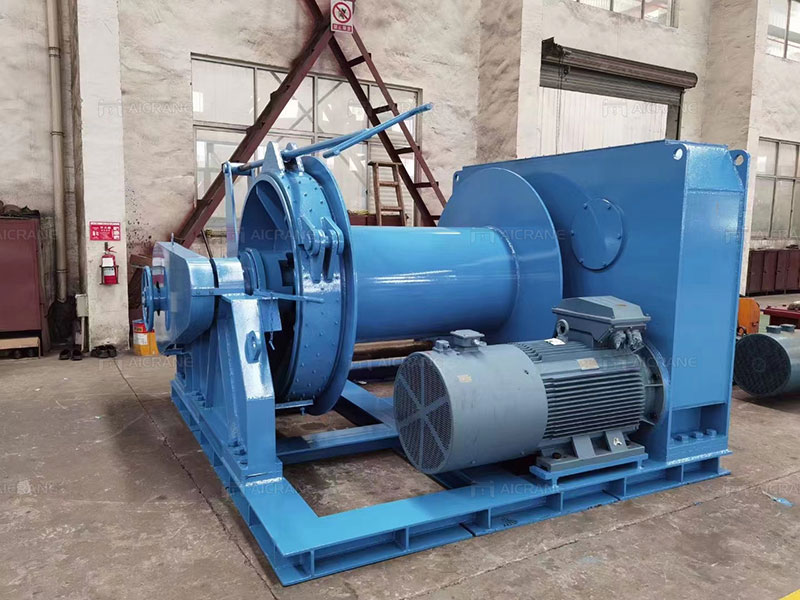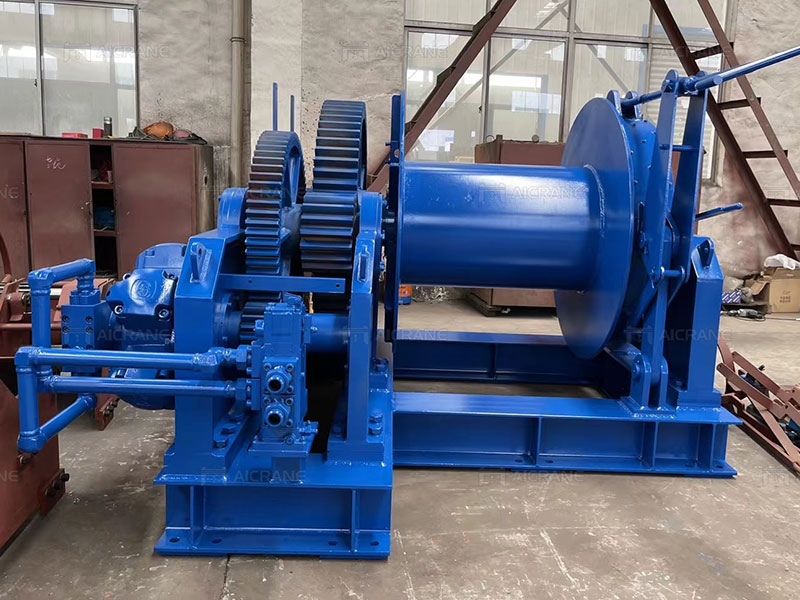The choice between an electric towing winch and a hydraulic towing winch depends on several factors, including the specific requirements of the application and personal preferences. Both types of winches have their advantages and considerations. Here’s a comparison of electric and hydraulic towing winches:
Electric Towing Winch
Advantages:
- Ease of Installation: Electric towing winches are generally easier to install compared to hydraulic winches since they require fewer components and hydraulic connections.
- Lower Maintenance: Electric winches typically require less maintenance compared to hydraulic winches, as they have fewer moving parts and hydraulic systems that need attention.
- Precise Control: Electric winches offer precise control over line tension and speed, allowing for finer adjustments during towing operations.
- Quieter Operation: Electric winches tend to operate more quietly than hydraulic winches.

Considerations:
- Power Limitations: Electric winches have a limited power output compared to hydraulic winches. They may not be suitable for heavy-duty towing applications that require extremely high pulling forces.
- Electrical Power Supply: Electric winches require a reliable power source, usually the boat’s electrical system or an auxiliary battery. This dependency on electrical power can be a consideration in remote or emergency situations.
- Overheating: Electric winches may be prone to overheating if used continuously for extended periods. Proper cooling measures should be taken to prevent overheating.
Hydraulic Towing Winch
Advantages:
- High Power Output: Hydraulic towing winches can generate higher pulling forces compared to electric winches, making them suitable for heavy-duty towing applications.
- Constant Power: Hydraulic winches provide a consistent power output, regardless of the load or duration of operation.
- Overload Protection: Hydraulic winches can handle overload situations better than electric winches, thanks to their built-in pressure relief and overload protection features.
Considerations:
- Installation Complexity: Hydraulic winches require additional components, such as a hydraulic power unit, hoses, and connections, making their installation more complex and potentially time-consuming.
- Maintenance and Service: Hydraulic systems require regular maintenance, including fluid checks and potential hydraulic hose replacements. Maintenance and servicing may be more involved than for electric winches.
- Control System Complexity: Hydraulic winches often require more complex control systems to regulate line tension and speed, which may involve additional hydraulic valves and controls.

Ultimately, the better choice between an electric towing winch and a hydraulic towing winch depends on the specific needs of the towing application, the desired power output, installation considerations, and maintenance preferences. It is recommended to evaluate the requirements and consult with experts or manufacturers to determine the most suitable winch for your specific needs.
Things to Consider When Buying A Towing Winch
When buying a towing winch, there are several important factors to consider to ensure you choose the right winch for your needs. Here are some key considerations:
Capacity and Power: Determine the maximum weight or pulling capacity required for your towing operations. Consider the weight of the loads you typically handle to ensure the winch has sufficient power to handle them. It’s essential to choose a winch with a capacity that matches or exceeds your requirements.
Winch Type: Decide whether an electric or hydraulic winch is more suitable for your needs, taking into account the advantages and considerations mentioned earlier. Consider factors such as power output, installation complexity, maintenance requirements, and control system preferences.
Mounting Options: Assess the available space and mounting options on your boat or vehicle. Consider the winch’s size, weight, and compatibility with your mounting location. Ensure you have adequate structural support and consider the winch’s orientation (horizontal or vertical) for proper installation.
Line Length and Speed: Determine the required length of the winch line based on your towing needs. Consider the speed at which the winch retrieves or pays out the line. Faster line speed can be beneficial for efficiency, but it may come at the cost of reduced pulling power.
Control Mechanism: Evaluate the control options available for the winch. Common control mechanisms include handheld remotes, control panels, or integrated controls on the winch itself. Consider the convenience, ease of use, and safety features of the control mechanism.
Durability and Quality: Ensure the winch is constructed from high-quality materials that can withstand the conditions it will be exposed to. Look for features such as corrosion resistance, weatherproofing, and robust construction to ensure the winch’s durability and longevity.
Safety Features: Check for safety features such as load-holding brakes, automatic shutoffs, and emergency stop functions. These features help prevent accidents and enhance operational safety during towing operations.
Brand and Reputation: Consider purchasing from reputable manufacturers known for producing reliable and high-quality winches. Research customer reviews and feedback to assess the reputation and reliability of the brand and product.
Budget: Set a budget for your towing winch purchase and look for options that provide the necessary features and performance within your budget range. Compare prices, warranties, and value for money among different brands and models.
Installation and Maintenance: Consider the installation requirements and complexity of the winch. Determine if you have the necessary expertise or if professional installation is recommended. Additionally, assess the maintenance requirements, including regular servicing, lubrication, and replacement parts availability.
By considering these factors, you can make an informed decision when purchasing a towing winch that meets your specific requirements and provides reliable performance for your towing operations.